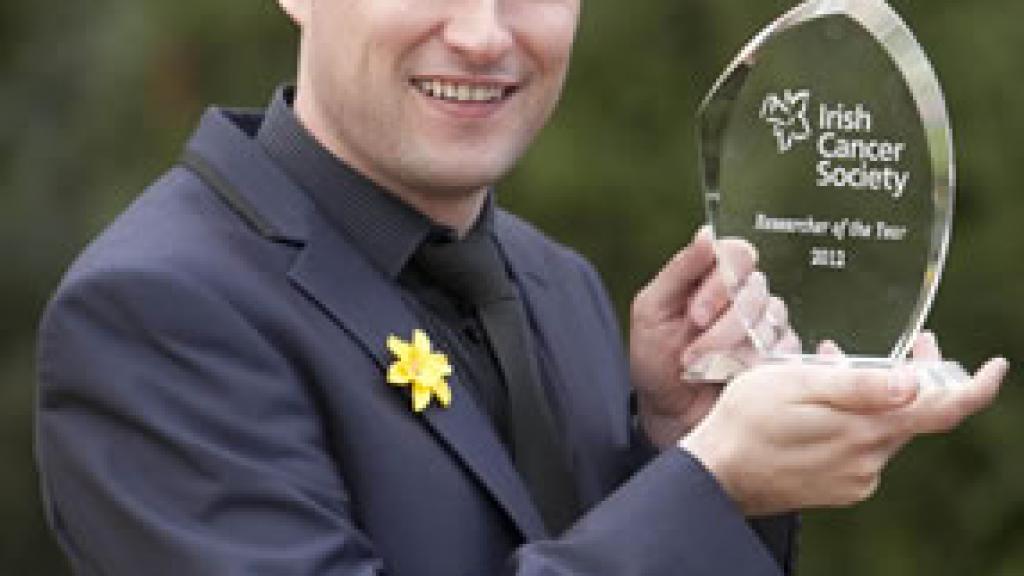
Genomic technologies will revolutionise cancer medicine, and cancer patients in Ireland will be among the first to benefit with the support of the Irish Cancer Society
Irish Cancer Society announces ‘Researcher of the Year’ at Celebration of Research 2013.
“Genomic technologies will revolutionise cancer medicine over the next several decades, and the Irish Cancer Society is well placed to lead world-class research, and the adoption of genomic technologies within mainstream clinical practice so that cancer patients in Ireland will be among the first to benefit,” said Professor Patrick Johnston, Dean of the School of Medicine, Dentistry and Biomedical Sciences at Queen’s University Belfast. Professor Johnston was speaking about the future of cancer research at the Irish Cancer Society’s Celebration of Research last night, at which awards were made to some of the leading lights in cancer research that are currently being supported by the Irish Cancer Society.
“Understanding the genetics of the tumour and the patient has already become increasingly important in the clinical management of cancer patients,” said Prof Johnston. “Treating cancer patients earlier with more targeted therapies has the potential to create longer periods of remission and potential cures in the future. The Irish Cancer Society’s funding of quality research in this area will help bring about a step change approach to treatment that will enhance cancer screening and prevention in this country.”Professor Desmond Carney, who was a recipient of a number of grants from the Irish Cancer Society in the late 1980s and early 1990s also spoke at the event, and outlined the significant contribution of the Society to cancer research over the last 50 years.
At last night’s special Celebration of Research, oesophageal cancer researcher, Dr Stephen Maher from Celbridge Co Kildare, was announced as the Irish Cancer Society’s Researcher of the Year 2012. Dr Maher, a Research Fellow previously funded by the Irish Cancer Society, scooped the top prize from the top three shortlisted candidates for his oesophageal cancer research entitled, ‘miR-31: turning up the heat in radio resistant oesophageal cancer.’ His research found microRNA-31 to be a predictive biomarker of response to radiation treatment, and a novel therapeutic agent with which to enhance the efficacy of radiotherapy. Speaking at the ceremony, Dr Maher said, “I am honoured to be awarded the Irish Cancer Society Researcher of the Year Award. The Society has been extremely supportive of my research project from the outset and I’m very grateful for their funding, without which this oesophageal cancer study would not have been possible. It’s my hope that this research, in addition to the research projects shared by the other Society Scholars and Fellows, will help change the lives of cancer patients for the better in Ireland.”
The other two finalists were Dr Carol Stone for her advanced cancer research at Our Lady’s Hospital entitled, ‘Recognising the risk of falling in patients with advanced cancer’ and Dr Eva Szegezdi, a Research Fellow currently funded by the Irish Cancer Society, at NUI Galway for her research entitled, ‘Blazing a new TRAIL in cancer therapy.’ Dr Stone’s study has led to the development of fall prevention policies for cancer patients and further research in this area. Dr Szegezdi’s study modified the structure of the TRAIL protein and generated a version of TRAIL that possessed a much higher tumour-killing activity and, as a result of mathematical modelling, identified potential therapeutics with high and specific tumouricidal activity.
Professor John Fitzpatrick, Head of Research at the Irish Cancer Society, said, “We are very proud of all three shortlisted researchers who are helping to further enhance Ireland’s contribution to the international cancer research community. We congratulate Dr Maher for his pioneering study, which was very deserving of this award for its powerful insights and results.”
“Last year, the Irish Cancer Society contributed more than €3.2 million to cancer research, making us the largest voluntary funder of cancer research in Ireland. This year, to mark our 50th Anniversary, we want to raise significant funding for cancer research on Daffodil Day (March 22nd), which will support our mission to make important discoveries that will move us towards a future without cancer.”
For further information on the Irish Cancer Society’s programme or to make a donation, visit www.cancer.ie or contact the Irish Cancer Society on Call Save 1850 60 60 60.
